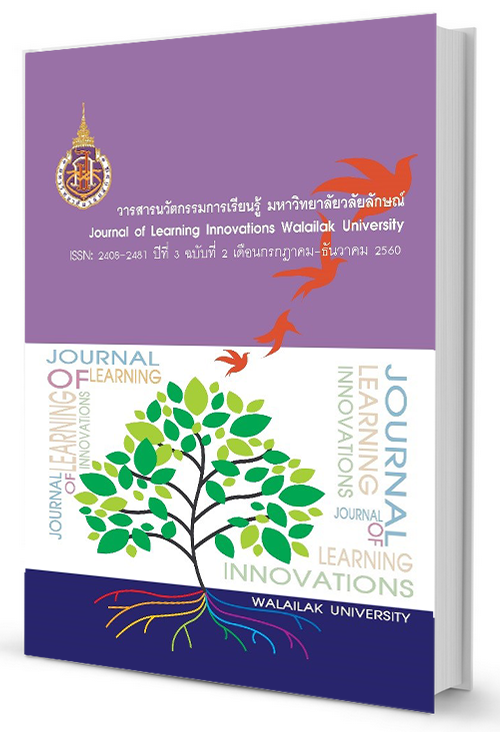Trends in Modern Teaching and Learning Methods using Online Formative Assessment Tools
DOI:
https://doi.org/10.14456/jli.2017.12Keywords:
Formative Assessment, Game Based Learning, Gamification, Student Response System, Student Engagement, Active Learning, 21st Century LearningAbstract
การเปลี่ยนแปลงอย่างรวดเร็วของเทคโนโลยีในยุคดิจิทัล ส่งผลอย่างยิ่งต่อการเรียนการสอนในปัจจุบันและวิธีการสอนที่จะเกิดขึ้นในอนาคต ขณะที่นักเรียนส่วนใหญ่นำสมาร์ทโฟน แท็บเล็ต หรืออุปกรณ์คอมพิวเตอร์ส่วนตัวมาใช้ในโรงเรียน ครูก็จำเป็นต้องฝึกทักษะการใช้งานอุปกรณ์เหล่านี้ไปด้วยเพื่อให้ทันต่อเทคโนโลยีและนำมาใช้ประโยชน์ได้ ทั้งนี้เนื่องจากแนวโน้มในการเรียนการสอนในช่วงไม่กี่ปีที่ผ่านมา มีการส่งเสริมให้นักเรียนใช้สมาร์ทโฟนแทนการห้ามและใช้ร่วมกับแอปพลิเคชันที่เรียกว่าเครื่องมือประเมินผลระหว่างเรียนทำให้เกิดการเรียนในรูปแบบการเรียนรู้เชิงรุกที่เน้นการมีปฏิสัมพันธ์ของนักเรียนทำให้ครูสามารถติดตามความก้าวหน้าของนักเรียนในแต่ละช่วงเวลาของการสอนได้ทันที ช่วยให้ครูสามารถปรับรูปแบบหรือวิธีการสอนและยังสามารถแนะนำนักเรียนที่เรียนอ่อนเป็นรายบุคคลได้ นอกจากนี้ การใช้เครื่องมือประเมินผลการเรียนส่งผลต่อความตั้งใจในการเรียน การมีส่วนร่วม ความสนุก ตลอดจนเพิ่มแรงจูงใจในการเข้าชั้นเรียน แต่เนื่องจากเครื่องมือเหล่านี้มีจำนวนมากทำให้ยากต่อการเลือกใช้ บทความนี้อธิบายความหมายของการประเมินผลระหว่างเรียน และแสดงประเภทของเครื่องมือประเมินผลระหว่างเรียน พร้อมทั้งการเปรียบเทียบคุณสมบัติที่สำคัญ และแสดงตัวอย่างของเครื่องมือและแนะนำเครื่องมือที่เป็นที่นิยมในการใช้งาน
References
Avampato, C. (2015). Weekly Trend: Formative Assessment Is Newest Trend in Personalized Learning. Retrieved from https://www.1776.vc/insights/weekly-trend-formative-assessment-is-newest-trend-in-personalized-learning/
Bailey, K. & Jakicic, C. (2012). Common Formative Assessment: A Toolkit for Professional Learning Communities at Work. Indiana: Solution Tree Press.
Cizek, G. J. (2010). An Introduction to Formative Assessment: History, Characteristics, and Challenges. in Handbook of formative assessment. Edited by Andrade, H. L. & Cizek, G. J. New York: Routledge.
Davis, V. (2017). Fantastic, Fast Formative Assessment Tools, Retrieved from https://www.edutopia.org/blog/5-fast-formative-assessment-tools-vicki-davis
Eatherton, T. (2014). Adventures in Technology. Techniques, 89(8), 8-9.
Faber, J. M., Luyten, H. & Visscher, A. J. (2017). The Effects of a Digital Formative Assessment Tool on Mathematics Achievement and Student Motivation: Results of a Randomized Experiment, Computer & Education, 106, 83-96.
Fisher, D. and Frey, N. (2007). Checking for Understanding: Formative Assessment Techniques for Your Classroom. Virginia: Association for Supervision and Curriculum Development.
Gorman, M. (2015). Over 35 Formative Assessment Tools to Enhance Formative Learning Opportunities. Tech & Learning, 36(4), 14.
Holland, B. (2014). The Backchannel: Giving Every Student a Voice in the Blended Mobile Classroom, Retrieved from https://www.edutopia.org/blog/backchannel-student-voice-blended-classroom-beth-holland
Irons, A. (2008). Enhancing Learning through Formative Assessment. Oxford: Routledge.
Keller, C. C. (2017). Using Formative Assessment to Improve Microscope Skills among Urban Community College General Biology I Lab Students. Journal of College Science Teaching, 46(3), 11-18.
Kirsch, B., Marlow, D., Pingley, A., Leonhirth, D., & Lownes, S. (2016). Improving Student Engagement with Technology Tools. Currents in Teaching & Learning, 8(2), 50-61.
Panero, M. & Aldon, G. (2016) How Teachers Evolve Their Formative Assessment Practices When Digital Tools Are Involved in the Classroom, Digital Experiences in Mathematics Education, 2, 70-86.
Porcaro, P. A., Jackson, D. E., McLaughlin, P. M. & O’Malley, C. J. (2016). Curriculum Design of a Flipped Classroom to Enhance Haematology Learning. Journal of Science Education and Technology, 25, 345-357.
Puarungroj, W. (2015). Inverting a Computer Programming Class with the Flipped Classroom, International Journal of the Computer, the Internet and Management, Vol.23(SP2), 40.1-40.7.
Smith, B. & Mader, J. (2015) Formative Assessment with Online Tools, Science Teacher, 82(4), 10.
Spector, J. M., Ifenthaler, D., Sampson, D., Yang, L., Mukama, E., Warusavitarana, A., Dona, K. L., Eichhorn, K. Fluck, A. Huang, R., Bridges, S. Lu, J. Ren, Y., Gui, X. Deneen, C. C., San Diego, J. & Gibson, D. C. (2016). Technology Enhanced Formative Assessment for 21st Century Learning. Journal of Educational Technology & Society, 19(3), 58-71.
Wang, A. I., & Lieberoth, A. (2016). The Effect of Points and Audio on Concentration, Engagement, Enjoyment, Learning, Motivation, and Classroom Dynamics Using Kahoot!. Proceedings of the European Conference on Games Based Learning, 1738-746.
Wang, A. I., Meng, Z., & Sætre, R. (2016). The Effect of Digitizing and Gamifying Quizzing in Classrooms. Proceedings of the European Conference on Games Based Learning, 1729-737.
Wash, P. D. (2014). Taking advantage of mobile devices: Using Socrative in the classroom. Journal of Teaching and Learning with Technology, 3(1), 99 - 101. doi: 10.14434.jotlt.v3n1.5016.
Wilson, C. (2014). Formative Assessment in University English Conversation Classes. Studies in Self-Access Learning Journal, 5(4), 423-429.
Downloads
Published
How to Cite
Issue
Section
License
เนื้อหาและข้อมูลในบทความที่ลงตีพิมพ์ในวารสารนวัตกรรมการเรียนรู้ มหาวิทยาลัยวลัยลักษณ์ ถือเป็นข้อคิดเห็นและความรับผิดชอบของผู้เขียนบทความโดยตรง ซึ่งกองบรรณาธิการวารสาร ไม่จำเป็นต้องเห็นด้วย หรือร่วมรับผิดชอบใดๆ
บทความ ข้อมูล เนื้อหา รูปภาพ ฯลฯ ที่ได้รับการตีพิมพ์ในวารสารนวัตกรรมการเรียนรู้ มหาวิทยาลัยวลัยลักษณ์ ถือเป็นลิขสิทธิ์ของวารสารนวัตกรรมการเรียนรุ้ มหาวิทยาลัยวลัยลักษณ์ หากบุคคลหรือหน่วยงานใดต้องการนำทั้งหมดหรือส่วนหนึ่งส่วนใดไปเผยแพร่ต่อเพื่อกระทำการใดๆ จ้อต้องได้รับอนุญาตเป็นลายลักษณ์อักษรจากวารสารนวัตกรรมการเรียนรู้ มหาวิทยาลัยวลัยลักษณ์ก่อนเท่านั้น


